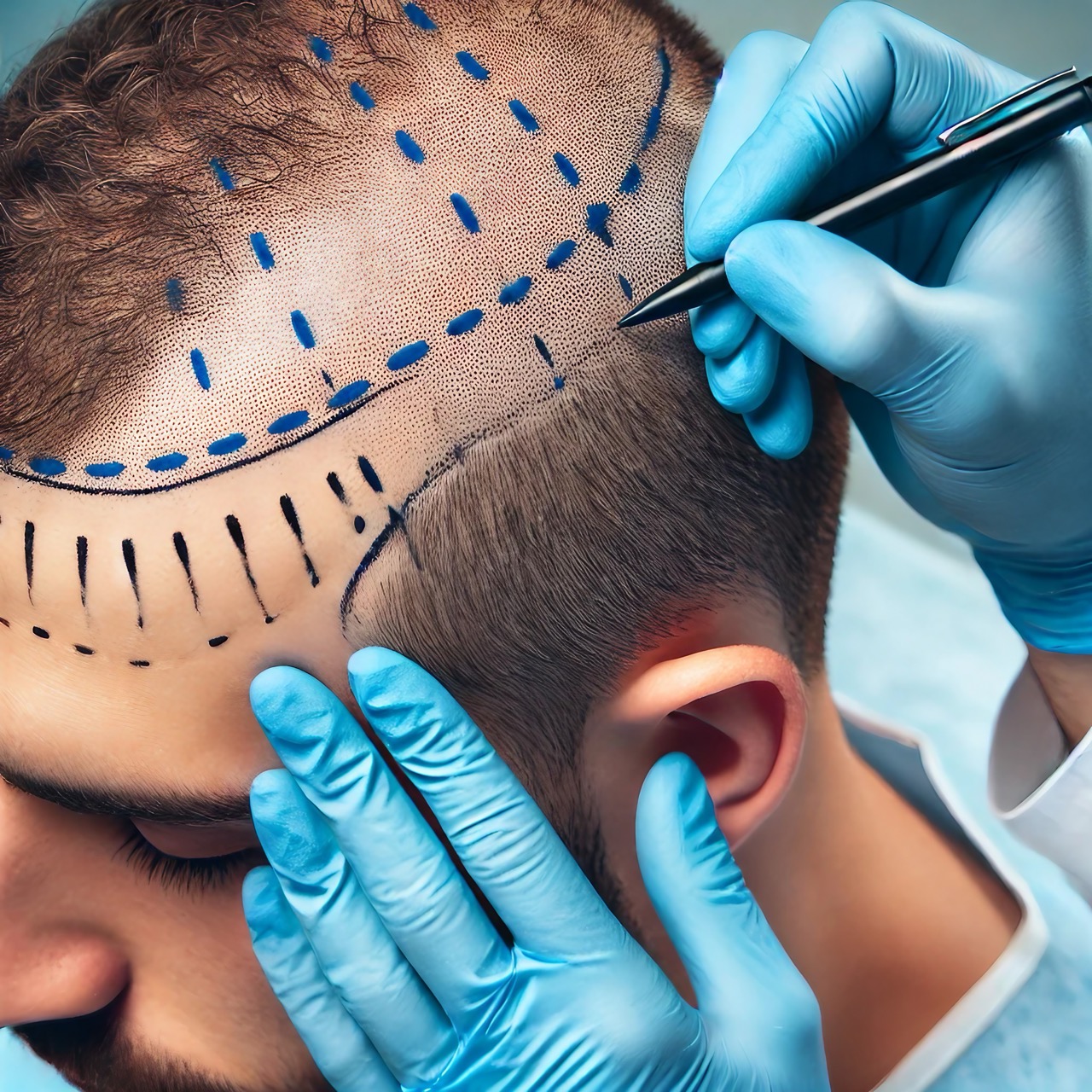Hair restoration techniques have advanced significantly over the years, with methods like FUE (Follicular Unit Extraction) and DHI (Direct Hair Implantation) leading the way in treating hair loss. However, a new frontier in hair restoration is on the horizon: Hair Cloning. Although still in its experimental stages, hair cloning offers the promise of unlimited hair follicles and permanent hair restoration. This breakthrough technology could revolutionize hair loss treatments, especially for those with significant hair loss or limited donor hair.
At Tour Medical, we partner with some of Turkey’s most advanced hair restoration clinics, where experts are keeping a close eye on developments in hair cloning. While the procedure is not yet available, Turkey is well-positioned to lead this breakthrough due to its reputation as a global hub for hair restoration treatments.
What is Hair Cloning?
Hair cloning, also known as hair follicle cloning or hair multiplication, is an innovative technique aimed at regenerating hair follicles using the patient’s own cells. Unlike traditional hair transplants, which involve moving hair from one part of the scalp to another, hair cloning focuses on multiplying hair follicle cells in a lab to produce an essentially unlimited supply of new hair.
How Hair Cloning Works:
- Extraction of Hair Follicles: A small sample of healthy hair follicles is taken from the patient’s donor area, typically at the back of the scalp.
- Culturing the Follicles: The hair follicle cells are isolated and cultured in a laboratory. Through advanced techniques, these cells are multiplied to produce new hair follicles.
- Implantation of Cloned Follicles: Once the new hair follicles are cultured, they are implanted into the scalp areas affected by hair loss. The cloned follicles behave like natural hair and grow continuously over time.
The Potential Benefits of Hair Cloning
If hair cloning becomes widely available, it could address many limitations associated with traditional hair transplants. Some of the significant benefits include:
- Unlimited Hair Supply: One of the biggest challenges in hair transplantation is the limited availability of donor hair. With hair cloning, patients could potentially have an unlimited supply of hair follicles, providing a solution for individuals with severe hair loss or limited donor hair.
- Natural Hair Growth: Cloned hair follicles are derived from the patient’s own cells, meaning the implanted hair would grow naturally, blending seamlessly with existing hair and being resistant to future hair loss.
- Less Invasive: Since hair cloning requires only a small sample of follicles to create multiple new ones, it could be less invasive than traditional hair transplant procedures, which involve harvesting a large number of follicles.
- Reduced Scarring: With fewer follicles needed from the donor area, hair cloning could result in even less scarring compared to FUE or DHI procedures.
- Ideal for Extensive Hair Loss: For patients experiencing significant baldness or those who have already undergone multiple hair transplants, hair cloning could offer the potential to regenerate the number of hair follicles needed for a fuller restoration.
The Current Status of Hair Cloning Research
While hair cloning is a promising solution for hair loss, it is still in the research and development phase. Scientists have successfully cloned hair follicles in laboratory environments, but several challenges remain before it can become a widely available treatment for humans:
- Scaling Up Production: Cloning a few hair follicles in a lab is possible, but producing enough viable follicles to treat an entire scalp remains a challenge.
- Ensuring Follicle Viability: Researchers must ensure that cloned follicles survive after being implanted into the scalp and continue to grow normally.
- Regulatory Approvals: Like any new medical technology, hair cloning will require regulatory approvals to ensure its safety and efficacy. Extensive clinical trials are needed to prove that the technique consistently works in humans.
Why Turkey Could Lead the Hair Cloning Revolution
Turkey is already a world leader in hair restoration due to its skilled surgeons, advanced clinics, and competitive prices. When hair cloning becomes commercially available, Turkey is likely to be at the forefront for several reasons:
- Expertise in Hair Restoration: Turkish surgeons are among the most experienced in the world, performing thousands of hair transplants each year. This makes them well-equipped to adopt new techniques like hair cloning.
- State-of-the-Art Clinics: Turkey's clinics are equipped with cutting-edge technology, making them ideal for introducing and perfecting new techniques such as hair cloning.
- Affordability: Turkey is known for offering hair restoration procedures at affordable prices. Once hair cloning is available, Turkey is likely to offer it at more competitive rates than clinics in Western countries.
- Medical Tourism Infrastructure: Turkey already has a robust infrastructure for medical tourism, with clinics offering all-inclusive packages that cover accommodation, transportation, and aftercare. This makes Turkey an attractive destination for international patients seeking advanced treatments like hair cloning.
The Future of Hair Cloning
While hair cloning is not yet available to the public, experts believe it could become a reality within the next decade. Ongoing research is showing promising results, and if the challenges can be addressed, hair cloning has the potential to revolutionize the field of hair restoration.
Patients would no longer need to worry about limited donor hair, extensive scarring, or the challenges of multiple transplant procedures. With an unlimited supply of cloned hair follicles, hair cloning offers hope to individuals who may not be candidates for traditional hair transplants.
15 Frequently Asked Questions (FAQs) About Hair Cloning
-
Is hair cloning available yet?
No, hair cloning is still in the research phase and is not yet available for clinical use. -
How long will it take for hair cloning to become widely available?
Experts estimate that hair cloning could be available within the next 5 to 10 years, depending on the progress of clinical trials. -
How does hair cloning differ from traditional hair transplants?
Hair cloning involves multiplying hair follicles in a lab, while traditional transplants move existing follicles from one part of the scalp to another. -
Will hair cloning provide permanent results?
Yes, since the cloned hair follicles are derived from the patient’s own cells, they should continue to grow naturally and be resistant to future hair loss. -
How many follicles can be cloned?
Theoretically, an unlimited number of follicles can be cloned, offering a solution for patients with extensive hair loss. -
Is hair cloning painful?
Like traditional hair transplants, hair cloning would likely involve minimal discomfort since the procedure still requires implantation. -
Can hair cloning be used for beard or eyebrow transplants?
Yes, hair cloning could potentially be used for facial hair restoration as well. -
Will hair cloning leave scars?
With fewer donor follicles needed, hair cloning could result in minimal scarring compared to traditional hair transplants. -
Is there a risk of rejection with hair cloning?
No, because the cloned follicles are made from the patient’s own cells, there is no risk of rejection. -
Can women benefit from hair cloning?
Yes, hair cloning would be suitable for both men and women suffering from hair loss. -
How much will hair cloning cost?
Initially, the cost of hair cloning is expected to be higher than traditional hair transplants, but prices could decrease as the technology becomes more widespread. -
Will hair cloning work for people with alopecia?
Hair cloning holds potential for treating various forms of hair loss, including alopecia, though more research is needed. -
Where are clinical trials for hair cloning taking place?
Clinical trials are being conducted in various locations around the world, including Europe, the US, and Asia. -
Can hair cloning be combined with traditional hair transplants?
Yes, in the future, patients may combine hair cloning with traditional transplants for optimal results. -
What is the success rate of hair cloning so far?
While still in experimental stages, researchers are seeing promising results in lab settings, though further development is needed for human applications.
At Tour Medical, we stay at the forefront of hair restoration advancements. While hair cloning is still on the horizon, our Health Tourism Authorized clinics are ready to offer cutting-edge treatments. Contact us for more information on the latest hair restoration options.
Email: info@tourmedical.com
 English
English














